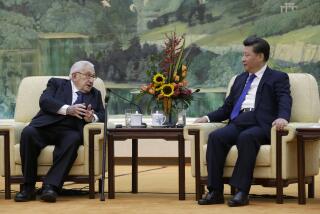On the Brink, Some Mutual Admiration : Diplomacy: Bush, Baker and Aziz pay tribute to each other’s professional skills.
- Share via
WASHINGTON — Like prizefighters or football linemen offering knowledgeable praise for the opponents they have been pummeling, President Bush, Secretary of State James A. Baker III and Iraqi Foreign Minister Tarik Aziz all went out of their way Wednesday to pay tribute to each other’s professional skill at the deadly art of brinkmanship.
“I must say, I thought his style was good,” Bush said of Aziz, offering the practiced appraisal of a former diplomat. “I didn’t agree with what he’s trying to do, obviously--to confuse the issue by refusing to discuss the point at hand, which is the invasion of Kuwait--but I thought he did it well.”
That was only one of several kind words offered after the day’s long meetings. It may have been the elaborate, unnatural courtesy that seems to arise among men who know that they are playing for the highest of all stakes--the pre-dawn calm before a duel, the fighter pilot’s tradition of long-range salutes, the courtly etiquette among generals in war. Or it may simply have been relief at discovering, after five months of ferocious rhetoric from both sides, that a civil conversation was still possible--even if the two countries still disagree about everything important.
“The tone of it was good,” said Baker, “as good as you could expect under the circumstances. We weren’t pounding the table and shouting at each other. It was a very reasoned and, I think, responsible discussion by two diplomats who really would like to find a peaceful and political solution to this problem. But . . . I did not detect flexibility.”
“From the professional point of view, they were good discussions,” agreed Aziz, an urbane negotiator who survived two decades of bloody purges to emerge as foreign minister in 1983. “The tone of his language was diplomatic and polite. I reciprocated. But the substance was full of threats, and I told him, also in substance, that we will not yield to threats. We would like to have genuine, constructive dialogue between us, between our two nations, in order to make peace in the region and between our two nations.”
Indeed, the day in Geneva was marked by an absence of the blood-curdling rhetoric that has marked most of the public exchanges between the two governments, including Bush’s references to Iraqi President Saddam Hussein as another Adolf Hitler.
“The tone here in Geneva was different,” Aziz noted. “It was a diplomatic tone, not the harsh tone which we are familiar with receiving through the previous statements.”
Baker offered Aziz his choice of how to structure the meeting. Aziz asked Baker to outline his position first--a sign, in retrospect, that the Iraqi did not have a major diplomatic initiative to unveil.
Baker described the U.S. position and handed Aziz a letter from Bush to Hussein. Aziz read the letter--”carefully and slowly,” he said--and announced that he was refusing to accept it. But even that calculated rebuff was handled calmly, officials said.
Aziz explained Iraq’s position. The two men talked at length of the strength of their respective alliances and the prospects for a negotiated peace between Israel and the Arabs.
After six hours, Baker said, they agreed to stop.
Baker, a successful Texas lawyer in private life, telephoned Bush in Washington and told him that he had met a worthy opponent. “When I talked to Jim, he said, ‘Look, the man presented his case,’ ” Bush said. “Clearly, we didn’t agree with it. I thought he (Aziz) was quite complimentary of the way the secretary of state did it. So the atmospherics, I think, were all right.”
More to Read
Get the L.A. Times Politics newsletter
Deeply reported insights into legislation, politics and policy from Sacramento, Washington and beyond. In your inbox twice per week.
You may occasionally receive promotional content from the Los Angeles Times.











